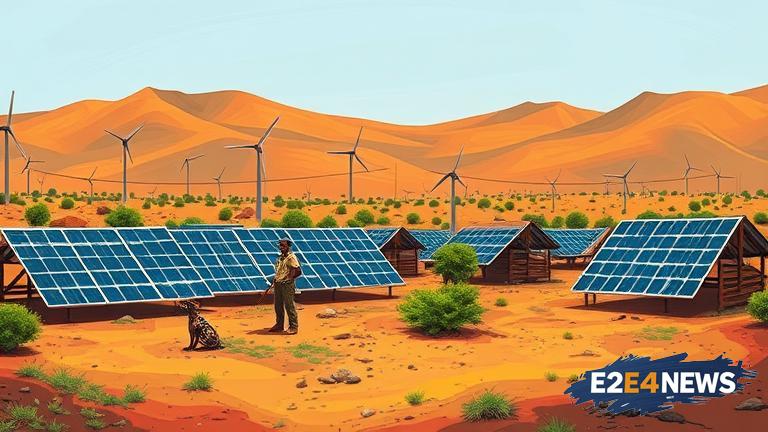The African continent is witnessing a significant shift towards renewable energy, driven by the need to address the pressing issues of energy access, climate change, and sustainable development. With many countries still struggling to provide electricity to their populations, renewable energy has emerged as a viable solution. Solar and wind power are becoming increasingly popular, with countries like South Africa, Morocco, and Egypt leading the way. The cost of renewable energy technologies has decreased dramatically over the years, making them more competitive with fossil fuels. This has led to a surge in investment in the sector, with many international companies and organizations committing to support Africa’s renewable energy ambitions. The African Union’s Agenda 2063 has set a target of ensuring access to clean and affordable energy for all Africans by 2030. To achieve this, the continent will need to increase its renewable energy capacity significantly. Several countries have already made significant strides in this direction, with Kenya, for example, aiming to generate 70% of its electricity from renewable sources by 2030. Rwanda has also set an ambitious target of becoming a carbon-neutral economy by 2050. The use of renewable energy is not only good for the environment, but it also has the potential to create jobs and stimulate local economies. In South Africa, the renewable energy sector has already created thousands of jobs and attracted significant investment. The country’s Renewable Energy Independent Power Producer Procurement (REIPPP) program has been particularly successful, with over 100 projects awarded to date. Morocco, on the other hand, has invested heavily in solar power, with the Noor-Ouarzazate complex being one of the largest solar farms in the world. Egypt has also made significant progress, with the Benban solar park being one of the largest in Africa. The African Development Bank has been a key player in supporting the continent’s renewable energy ambitions, providing financing and technical assistance to several countries. The bank’s New Deal on Energy for Africa aims to achieve universal access to energy by 2025. The International Renewable Energy Agency (IRENA) has also been working closely with African countries to support the development of their renewable energy sectors. Despite the progress made, there are still significant challenges to be addressed, including the need for greater investment, better infrastructure, and more effective policies. However, with the continent’s vast renewable energy resources and growing demand for clean energy, the future looks bright for Africa’s renewable energy revolution. The private sector is also playing a crucial role in driving the growth of renewable energy in Africa, with companies like Vestas, Siemens Gamesa, and Goldwind investing heavily in the sector. As the continent continues to transition towards a low-carbon economy, it is likely that renewable energy will play an increasingly important role. With the right policies and investments in place, Africa can unlock its vast renewable energy potential and achieve a sustainable and prosperous future. The benefits of renewable energy are numerous, ranging from reduced greenhouse gas emissions to improved air quality and enhanced energy security. As the world continues to grapple with the challenges of climate change, Africa’s renewable energy revolution is a beacon of hope for a more sustainable future.
